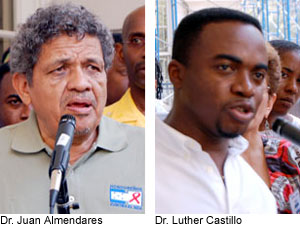Honduras coup made in Washington?
By Saeed Shabazz -Staff Writer- | Last updated: Aug 16, 2009 - 12:25:46 PMWhat's your opinion on this article?
Honduran delegation seeks support for ousted president

Photos: Amadi Ajamu
|
President Manuel Zeleya was removed by military coup on June 28 and sent into exile, while interim President Roberto Micheletti was appointed to replace him. Mr. Micheletti has been a member of the Honduran Congress since the 1980s and has strong ties to the business elite in Honduras, according to news reports. However, the coup is not popular in Honduras, according to speakers at the Aug. 4 press conference.
Dr. Almendares labeled the coup a remnant of the foreign policy of former President George W. Bush. “We are struggling to maintain our freedom of speech. Every day someone is tortured and put into jail in Honduras,” he said.
Reports in the Western press indicate the Honduran Supreme Court ordered Mr. Zeleya removed because he was trying to seek a constitutional referendum to lift presidential term limits—an attempt the court denied. A president may only serve one term under the present constitution.
Observers say the embattled president had joined a movement across Latin America to rewrite constitutions to include comprehensive human rights provisions, which is fueled by grassroots activity over the past decade. In Honduras the movement for a new progressive constitution is led by the Garifuna (Afro-Honduran) community, indigenous communities, impoverished urban dwellers and human rights advocates.
The World Bank reports Honduras is one of the poorest nations in Latin America, with a majority of its seven million citizens living on less than $100 a month and suffering from high literacy, hunger and disease.
“We knew when President Zeleya sided with us, the people, in wanting to change the constitution to help the people gain power, there would be trouble,” Abencio Fernandez told The Final Call. “The people are behind any constitution that will represent the interests of all the people in Honduras,” he said.
Attorney Roger Wareham, of the December 12th Movement, told reporters the “Zeleya-initiated improvements to the quality of life for the Garifuna, Indigenous and poor peoples of Honduras, such as raising the minimum wage, are being sacrificed to preserve the stolen wealth of a military-backed oligarchy and the multi-national corporations seeking greater profits.”
The December 12th Movement and the International Association Against Torture organized the delegation's visit to New York to raise awareness of the coup and gain support for a city council resolution that urges the United States to restore democracy in Honduras. The groups, along with city council members Charles Barron and Melissa Mark-Viverito called on President Obama to immediately recall the U.S. ambassador to Honduras, Hugo Llorens, a Bush appointee.
“We demand that the U.S. begin its process of upholding democracy by recalling its ambassador until President Zeleya has been unconditionally returned to office,” said the organizations and political leaders in a joint statement.
President Obama has taken some action against the de-facto government. On Aug. 3, Philip J. Crowley, assistant secretary of state for public affairs, announced the visas of four Honduran diplomats were being revoked. However, he made no statement concerning the recall of Amb. Llorens. Calls by The Final Call to the White House and State Dept. were not returned.
The Obama administration has frozen some $16 million in military aid. But, a Washington-based think tank, the Center for International Policy, said more could be done, including freezing some or all of $180 million in promised economic assistance and recalling 600 American troops stationed at the Palmerila military base, to bring Mr. Micheletti to the table.
A freeze in trade would bring the quickest results, since Honduras depends on the U.S. for 70 percent of its export market, according to the think tank.
The State Dept. said the administration will continue to support the mediation efforts of Costa Rican President Oscar Arias and the Organization of American States to hammer out a compromise that could return Mr. Zelaya to power. But according to the Associated Press, Mr. Zelaya would have to pledge not to attempt to reform the constitution. Elections are scheduled for Honduras in November.
The New York-based Council on Foreign Relations said the Obama administration “putting its diplomatic weight behind a mediation effort has demonstrated sensitivity to Latin American sensibilities.” The group also said it is “important that the U.S. won't go back to the days of single-handed, heavy-handed intervention” in Latin American affairs.
Related links:
US 'involved in Honduras military coup' (PRESS TV, 08-16-2009)
Ousted Honduran president: ‘I offended those who make money off the poor' (FCN, 07-13-2009)
Social unrest, tensions build days after Honduras coup (FCN, 07-07-2009)Honduras President overthown in military coup (FCN, 06-29-2009)
Venezuelan president says U.S. played key role in ’02 coup attempt (FCN, 03-05-2004)
Memo reveals US backed "anti-leftist" coups (PRESS TV, 08-17-2009)
INSIDE STORIES AND REVIEWS
-
-
About Harriett ... and the Negro Hollywood Road Show
By Rabiah Muhammad, Guest Columnist » Full Story -
Skepticism greets Jay-Z, NFL talk of inspiring change
By Bryan 18X Crawford and Richard B. Muhammad The Final Call Newspaper @TheFinalCall » Full Story -
The painful problem of Black girls and suicide
By Charlene Muhammad -National Correspondent- » Full Story -
Exploitation of Innocence - Report: Perceptions, policies hurting Black girls
By Charlene Muhammad -National Correspondent- » Full Story -
Big Ballin: Big ideas fuel a father’s Big Baller Brand and brash business sense
By Bryan Crawford -Contributing Writer- » Full Story






 Click Here Stay Connected!
Click Here Stay Connected!








